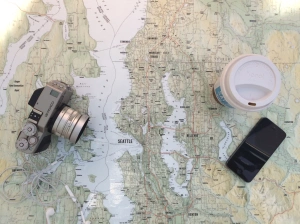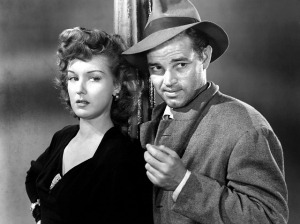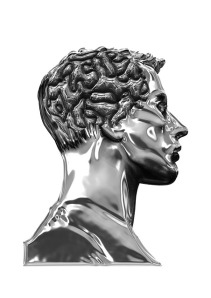
“One at a time, one at a time.”
Gabriel beat his drum as he spoke, thumping a musical pace for those who passed by. There was a lively chatter of excitement as everyone shuffled forward, feeling the mounting tension of a deep breath before a plunge.
“One at a time, please. Thank you.”
The line seemed endless. Faces of every size and shape and color dotted the line, emerging from the white robes that covered them. It was a beautiful scene. There were clouds, certainly, but so much more than clouds. It was a funny thing that when people imagine heaven’s gates they think of nothing more than white, fluffy clouds and pleasant boredom. The truth couldn’t be more remote.
There was grass, for one thing, peppered with wildflowers and dotted with boulders. Two stags leaped and redounded, chasing one another and suddenly switching roles in what appeared to be a game of tag. They cut sharply through the line, causing a dashing young man to hop backwards with a startled laugh. Gabriel rolled his eyes.
“Sorry about that,” he called to the man. “Nori and Fifflebum get excited when a new group comes in.”
The man smiled, his thin mustache moving with his lip.
“Oh, they have names! How wonderful!”
Gabriel continued tapping and popping at his drum as one by one, new arrivals reached the base of the mountain, stepped upon a nimbus, and were whisked up the rolling slope toward the pearly gates. Gabriel raised an eyebrow.
“Yes, he has a name; of course he has one. Both of them. Is that strange to you?”
The young man stepped forward another place in line and laughed. He had an excited nervousness about him. Who could blame him? They all did.
“I guess it shouldn’t. People name pets and things back where we came from. Those deer- and those owls, and those lions- well, they just seem more human, if that makes any sense. More lifelike, at any rate.”
The stags crashed through a thicket of berry bushes, twisting and turning as Fifflebum pushed to catch up with Nori. They ran past a sleeping tiger- who was apparently not sleeping, for he leaped up and wrapped the animal in his great paws, bringing both of them to the ground. The handsome young man watching with Gabriel was taken aback for a moment, until he saw that the other stag was not worried. He ran up to his counterpart, tapped him with his hoof, and then he was off again. The tiger released his grip, rolling on the ground and making sounds that sounded not unlike laughter, mixed with more felinity.
“Is that tiger laughing?”
“Oh, yes,” Gabriel answered. Humans always asked the most adorable questions when they arrived. “The animals are a bit more alive here than they are on earth. It’s only fitting, because the same is true of you. How did so many of you come to arrive today, anyway?”
The young man rolled his eyes.
“Iceberg. We were all aboard a ship that was supposed to be indestructible.”
Gabriel chuckled.
“Well, the best laid plans.”
The young man laughed with him, almost up to the front of the line now.
“Will you answer a question for me, angel, sir?”
“It’s Gabriel. And I’ll do my best.”
The handsome young man held out his hands and looked at them.
“Gabriel, then, thank you. I can’t see my face, but I can see the rest of me. I don’t look a day over thirty-five; maybe even less!”
Gabriel began to nod knowingly as the beat went on, popping and ringing like a djimbe. He had heard this one countless times.
“Yes?” Gabriel encouraged him. He was only three people from the front now.
“This morning I was an old man. Eighty-one, if you can believe it. And furthermore, there were lots of us old folks aboard that ship, but there aren’t any old ones here.”
“‘Lay down your burdens and welcome in, Sorrow, sickness, pain and eld, Are not permitted, and won’t begin.’”
“What was that?” the young man asked.
“Just a line from a poem. No one is old here. Time itself, actually, isn’t really much of a concept here. Its purpose has been fulfilled.”
Two people from the front now, where a nimbus would come and usher him into the shining gates of the heavenly city, the young man looked as though he was about to ask another question, when Gabriel’s attention was stolen elsewhere.
It was an angry one, that was for certain. Of course, this sort was always angry. Rage seemed to be their defining characteristic. Perhaps hopelessness defined them better, but this one was nearly steaming from the top of his bald, liver-spotted head. Gabriel continued playing his drum, but his attention caught the handsome young man’s attention, and together they both watched as the old one approached.
“I though no one was old here,” the young man started.
“You’ll see,” Gabriel answered him with a sigh.
The stalking, shaking, angry old man twitched as he made his way toward Gabriel and the new arrivals. He avoided proximity to the line with unabashed disgust, attempting to spit on those who waited, but never seeming to hit his mark. Most seemed not to notice him.
As he caught sight of Gabriel, with his eyes afire in rage and enmity, he continued his cursing and muttering, but his course was set for the angel. Gabriel sighed and lifted his eyes briefly heavenward- which was only a few thousand yards away.
“God, give me patience.”
“You!” the old man screamed, physically shaking his fist at Gabriel. He spit to the side and then, somehow, he managed to scrunch up his face even more than it had been previously. “You…”
“Excuse me,” a polite voice spoke up from behind the handsome young man. “It’s your turn.”
“Oh,” the young man exclaimed. He looked to the nimbus, then to Gabriel and the confrontational old man. “I’ll just be a minute, thank you. You can go on ahead.”
She smiled, and did just that, stepping on a nimbus with her arms outstretched. The wind played through her long, curling hair, and her squealing laughter echoed across the plane.
“Can I help you with something?” Gabriel said, clearly trying to be patient. It was not the easiest thing for him, apparently. The old man spit again.
“No, I don’t think you can. And if you could, I wouldn’t want you to, you piece of garbage!”
He swore colorfully for several seconds. The handsome young man leaned into Gabriel’s ear.
“He was with me on the boat. He was much younger, I think- if it’s even him. We became a sort of friends.”
“A lot of people who were on the boat aren’t in this line, I’m afraid.”
“You call that a paradise?” the old man shouted, pointing up to heaven with his broken, splintered cane. His hand bled from gripping it so. “You think I don’t know what it is up there? What you do to people?”
Gabriel sighed, shaking his head.
“Did you have a question, a request, or would you just like to yell?”
“I don’t have to take this!” the old man wheezed, shouting for all he was worth, though it clearly pained his old throat. “It isn’t justice, you know. Taking some and sending the others to Hell? Well there’s no paradise in exclusion, you know? I would know! I’ve studied philosophy for years and years and friggin’ years!”
“Oh have you?” Gabriel said, trying to avoid the conversation as much as possible.
The old man swore some more.
“You think you’re all so righteous, hogging all of the good stuff and leaving crap for the rest of us! You’re the evil ones, not us! Not us, but you…” He narrowed his eyes and leveled a pointing, shaking finger. “There is no paradise in exclusion.”
“Excuse me, sir?” another friendly voice piped up behind the handsome young man. “It’s your turn, I think.”
“You can go ahead of me,” he replied. Then, turning to Gabriel, he whispered. “What is this?”
Gabriel shook his head.
“Someone from Hell. Destined for it, anyway.”
“Oh, so I was destined for Hell?” the shaking old man railed. “Where is the justice in that? The game was stacked against me from the start; but I’ve got a surprise for you! What’s waiting for you up there is not beautiful or good- it’s all a lie! Hahaha, it’s all a lie, you fools. There is no paradise in exclusion. How could He send me to Hell? Is that love? No!”
Interrupting what was a rather emphatic, poisonous string of cursing, Gabriel spoke to the impassioned curmudgeon.
“Well, would you like to come in then?”
The old man spit.
“What, into heaven?”
Gabriel nodded soberly.
This quieted the railing octogenarian for a moment. He eyed the angel with suspicion.
“You lie to me for your own twisted amusement.” He spat the words with disdain.
“I do not,” Gabriel returned in a soft voice. “Take off your filthy rags, wash in the stream, and we will clothe you in a fine robe, like these. Your age will fall away, and you will be welcomed into the presence of God, to rejoice and live in fullness forevermore.”
“It’s going to be great!” the handsome young man assured him. “We’ll get to see Jesus!”
The old man scoffed, and then he coughed furiously, his eyes trying their best to murder the angel and the young man. Somehow, his hands were restrained, else they would have found themselves closed around the necks of those with whom he spoke.
“I don’t want to see God,” he growled. “And I certainly don’t want to see Jesus. You make me sick, you dirty thieves. Liars! Perverted distortioners! There is no heaven in exclusion, don’t you see, you fools?”
The handsome young man looked puzzled. Gabriel only blinked slowly.
“Would you like to come in, or wouldn’t you?”
“Come in!” the young man urged him.
The old man gestured rudely and shouted once more.
“I would rather rot in the hot darkness of Hell before I would set one foot in that abomination called heaven.” He began to curse, then, his voice occasionally rising as he turned and walked away, joining the masses of huddled souls pushing and shoving in the opposite direction as the line of heaven-goers. He eventually faded away, meshing into the wide road filled with men and women who screamed and looked more like fiends then people.
“Excuse me, sir?” another patient voice spoke up behind the handsome young man. “Your nimbus is here.”
“You can take it,” he replied. “I’ll get the next one.”
The handsome young man stood in silence a while, staring off as Gabriel continued playing his drum.
“Would you really have let him in?”
The angel nodded.
The handsome young man pondered some more.
“What happens when people like that take you up on the offer?”
“They never do.”
The young man raised his eyebrow.
“That doesn’t make any sense.”
“And yet it’s true,” Gabriel sighed. “Anyone who wishes can enter into paradise, but the decision made on earth never deviates from the decision a person makes here. That man was heading for Hell his entire life, and he knew it. He wanted it. He won’t be happy there, of course. No one will. But it’s what he chose, anyway. That’s part of the reason he’s so angry.”
“But no one is that angry… I’ve never seen it.”
“They’re all like that, I’m afraid.”
“I’ve known many a pleasant man who didn’t have any faith.”
“I’m certain that you have, but ‘pleasant’ can’t withstand the strain of death. In this place, you humans become fully like yourselves- either a new creation, full of life, joy, vigor, worship, and goodness and youth- or a dead, old shell of a person. Angry, bitter, and full of sorrow and pain. More like a demon than a man.”
“So… was he right? Is there a paradise in exclusion?”
Gabriel shrugged.
“We may never know. You can ask God when you get up there. I think whether there is or not doesn’t really matter. There doesn’t need to be exclusion for people to sort themselves out.”
“He could come in, and he doesn’t?”
“That’s right.”
The handsome young man shook his head, letting go of the burden.
“That’s stupid. Can you argue with him? Get him to change his mind?”
“Oh, I’ve tried,” Gabriel replied. “Doesn’t do any good. Same decision on earth, same decision here.”
The handsome young man watched as the stags weaved through an outcropping of boulders, then collided, trumpeting in exultation. The birds sang as they swooped by, and the wind brought with it the scent of primroses. The lively, excited chatter, continued. Gabriel sighed, then gathered a smile for the handsome young man.
“Excuse me, sir,” a voice behind him began. “Your nimbus is here.”
The handsome young man glanced back, and sure enough, a personal little cloud sat at his feet, docked and ready to carry him into bliss.
“Yes,” he replied. “Yes, I suppose it is.”
“I’ll see you up there,” Gabriel offered as the young man stepped onto the nimbus. He nodded at the angel.
And then, as the cloud began to move and the wind caressed the smooth contours of his youthful face, a wide smile, greater than any he had grinned before, began to spread across his face.
How could it not? He was about to see God.









